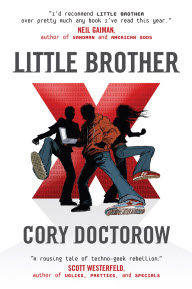Cory Doctorow’s Little Brother (Published January 1, 2008, Tor Teen, New York looks at a number of issues but in particular surveillance. Its 1984 reference is unlikely to be lost on the audience that the text is aimed at, however it has likely also served to introduce a new generation to George Orwell’s classic. Surveillance is a very real issue for young people, with the prevalence of mobile devices and geo-tracking, geo-tagging in pictures, spy wear (both for malicious use and parental surveillance) and the increasing surveillance of children in schools, most notably the case of school issued laptops and tablets being used to spy on children. The Plot, very briefly, is about a group of teenagers in San Francisco, and the anti-terrorist crack down after a terrorist attack and the impact that such measures have on ordinary citizens. The teenagers rebel and of course draw the attention of the authorities. Doctorow describes it simply “…all security has a cost. That cost has to be commensurate with the potential risk…” (Doctorow in interview with Bernick, P., Steele, R., Bernick, G., 2010 p436)
Cory Doctorow
Image from Wikipedia
Whilst the issue of online safety is taught to younger people it is often from the perspective of protecting them from malicious intervention such as stalkers and pedophiles it is not often discussed from a civil rights point of view. In short information around e-security sees “young people as victims not agents” (Barnard-Wills, 2012, p252). Young people are well equipped to manage the way that they interact with technology so as to ensure their own privacy. Most education assumes a passive audience, or a simple ‘do and don’t’ approach to privacy rather than giving young people the tools and understanding to be active participants in their online presence. Such issues are not often seen as issues for young people to deal with, but rather the concerns of parents, however as is observed above parents can also be the perpetrators of such surveillance and as such an autonomous and educated approach to these issues is very important to young people. In many cases knowledge of such concerns is more important to young people who have less control over the policies and procedures that routinely put surveillance in place.
Image: Creative Commons
In addition there is the concern of young people themselves being perpetrators of breaches of privacy. In a Vic Health Survey quoted in an Age Online article regarding violence against women 50% of 16-24 year olds felt that is was okay to electronically track your partner without their consent (The Age, 2015). This is a sobering statistic that shows that many young people are unaware of the implications of breaches of privacy, particularly if they are perpetrated by themselves with, at least in the first instance, seemingly innocent intentions. A simple issue such as a breakup and the use of Facebook can raise a number of concerns for young people, and the implications of their actions are not always thoroughly thought through, particularly the concerns about controlling behavior and future domestic violence (Lukacs & Quan-Haase, 2014). Young people are taught that privacy is about avoiding predators, rather than privacy, particularly online, as a human right and an ethical concern. Books such as Little Brother introduce these issues to young people in an interactive way, encouraging them to engage with the narrative and consider their own place in such ethical issues as privacy and surveillance.
References:
Barnard-Willis, D., (2012) E-safety education: Young people, surveillance and responsibility, Criminology & Criminal Justice, Vol.12 Issue 3 Page 239-255 July 2012
Bernick, P., Steele, R., Bernick, G., and Doctorow, C., Interview with Cory Doctorow about “Little Brother”, Journal of Adolescent & Adult Literacy, Vol. 53, No. 5 (Feb., 2010), pp. 434-439
Doctorow, C., Little Brother, 2008, Tor Teen, New York.
Orwell, G., 1984, 1961, Signet Classic, Chicago.
Perkins, M., The Age Online: http://www.theage.com.au/victoria/many-young-people-have-worrying-attitudes-to-violence-against-women-report-20150923-gjt3nq.html
Lukacs, V., Quan-Haase, A., Romantic breakups on Facebook: new scales for studying post-breakup behaviors, digital distress, and surveillance, Information, Communication & Society, Online 24 September 2014



You have raised some very interesting points. It always amazes me how many students at my primary school have access to social media sites to communicate with their friends. As a result the amount of times our school has needed to deal with behaviour issues arising from comments made on social media websites between children, has risen in the last few years. I’m with you! Rather than children being told “don’t do this’ they should be told “if you’re going to do this, then you need some skills that go along with it.” Perhaps this could stem the amount of complaints coming from parents.
I particularly liked your point of students being seen as ‘victims’ instead of being ‘agents’. Children need to be made aware that it is not just how their communications affect others, but what they say is a reflection of them and can in turn, affect them. They need to be taught ethical ways to use social media sites. As you said, it’s their human right.
LikeLike